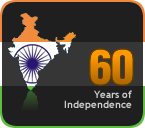My other grandmother was the one who helped my mother in bringing us up. Her name was Parvathi. She lived in Karamanai, a suburb of Trivandrum, on the banks of the river Karamanai. It was then a Brahmin settlement, comprising nearly ten streets, lined with row-houses, all double-storied, with common courtyards and separate backyards. We called her simply Karamanai Ammai. (Karamanai Mother).
Karamanai Ammai slept with us, woke up with us, laughed and cried with us, nursed and tended us in our sickness, told us stories, scolded us for our misconduct, praised us to the skies even for our small successes and good conduct. She endeared herself to us to such an extent we always wanted her to be with us, fought with each other to sleep by her side at night. She taught us what life was, to use discretion, to talk less and work more. She disciplined us to be self-sufficient, to run all our errands inside the house, and not depending on others to do things for us.
Her favourite proverb was, ‘Uthadu theyamal ullangal theyanam.’ Which means, ‘Instead of wearing out your mouth, use your feet’. This is engraved so deeply in my mind, even today as far as possible, I try to do things for myself. Her favourite curse for her grandchildren was , “Nasamattu poka”, which literally means “Be free of all that is bad and unwanted.”
It was she along with the midwife who helped us deliver our babies. It was her strict rule and order that during the labour, we should never make a groan or grunt which may be heard by the others waiting outside the room. We sisters instilled this rule in our daughters also at the time of their confinement, and if Karamanai Ammai was alive today, she would be proud of her great granddaughters. My sisters and I always went to our parents’ place to have our babies. In those days one did not go to the hospital to deliver babies. The midwife used to come home to check us periodically and help us with the childbirth. After that it was Karamanai Ammai, who took charge of the new mother and the baby for the next four weeks. She would herself prepare the lehiyam (special medicine) which was a must for the next 90 days.
When we were little girls along with her storytelling, she taught us a little about sex also. I remember one or two of those stories. A poor couple was cutting grass in the fields, when they heard an announcement that the Maharaja was coming that way. Immediately the woman undid the mundu (piece of cloth worn like a skirt) she was wearing around the waist, and covered her breasts with it. When asked why she did that, her answer was that what she was born with was nothing to cover, but what she had developed after growing up, should be hidden from other eyes.
Karamanai Ammai was born in the 1870s. She got married before she was eight years old, as was the custom in those days. What really intrigued me was that she started running her house for her husband when she was barely 11 years old, just a child and not a woman yet. My grandfather was a school teacher, and he was sent to a distant town (from Karamanai, part of Trivandrum) to teach. So Karamanai Ammai was sent with him to cook for him and generally take care of him. Nowadays one cannot even imagine such an idea. Even at the tender age, she was able to stop the landlady, a widow in whose house they lived, from pilfering her kitchen provisions. She used to insert a stick from the broom in the container in a particular way. If the container was tampered with, the stick would be out of place, which helped her to tackle the old lady.
Once they settled down in Karamanai, she became very friendly and popular with everyone in her neighbour hood. She was ever ready to help and advise everyone who approached her. She was listened to with respect and love, and was generally known as Parvathi Chithammai.
Though my grandfather’s pay as a school teacher was very low, she used to help people both in kind and cash. She even managed to save enough money to leave a substantial amount for her four children when she died in 1959.
My grandfather, Karamanai Appa, passed away when I was four years old. Still, I remember him - a pious, god-fearing man, loving and caring to his grandchildren, he always had a stock of crystallized sugar and dried grapes to give us whenever we visited him.
She had four children, three daughters and a son, and my mother was the eldest. Our uncle (mama) and his wife were childless. Though my aunt conceived many times, no child survived. In those times women who were childless were looked upon with disdain, and excluded from auspicious occasions. Karamanai Ammai was entirely different. She never let her daughter-in-law down. My mami was the one to lead in all auspicious occasions, whether it was a wedding in the family or kaapu, the seventh day ceremony, of the new born baby. There was so much affection and understanding between them.
 My mother, seated centre, with mami on her left. The other ladies are my sisters, and the children my nephews and nieces.
My mother, seated centre, with mami on her left. The other ladies are my sisters, and the children my nephews and nieces.A neighbour of Karamanai Ammai had two daughters of marriageable age, ten and eight. They had fixed the marriage of the older child. Karamanai Ammai suggested that they get the younger one married on the same muhurtham , to cut down expenses. She herself chose the girl’s mama (maternal uncle) as the bridegroom, and she allowed her friend to borrow her daughter-in-law’s wedding sarees, ornaments and a few silver pieces for the occasion. Our mami also raised no objection. Everyone in the locality applauded the generosity of my grandmother.
My grandmother was very shrewd, at the same time very diplomatic and solving her own and others’ family problems. I used to feel that given the chance and proper education, she would have been a good match for any of today’s well-educated, highly placed women in any capacity. The pity is that such women were born a hundred years before time, and lost their chance to become celebrities.
My father had great respect for her wisdom and shrewdness. He consulted her in many family maters, including his sisters’ marriages and settling them down. With her limited resources, she helped my parents also, helping them to settle down in Trivandrum.
Here is a story which shows how much my grandmother was respected by young and old. My mother, a native of Karamanai, never got over her love for a bath in the river. Living in the city, she just could not find the time to go to the river everyday. But once a week, mainly on Saturdays, after my father left to go to the court, she used to take me and my sisters to Karamanai to give us a good oil bath at the river. One day, after bathing in the river we went to our grandmother’s place for lunch. Suddenly while eating my mother remembered that she had folded a Rs.100 note in her saree pallu when she left home. And that it must have fallen in the water when she was undraping the saree to take a bath. When my grandmother heard this, she stopped eating at once, and went to the river bank, where there were a few late bathers and children playing. On enquiring, she found that a poor boy had found a Rs. 10 note floating in the water and had taken it home. It took some time to locate the boy. On being asked about the money, he did not admit at first to finding it. But the very sight of my grandmother made him come out with the truth. He had taken the money to the local (and only) grocer, got half a rupee’s worth of one day’s requirement (like rice and other condiments) for cooking, and had given the change to his mother. My grandmother heard him out, and took him along to the grocer, and challenged him. The grocer came out with the truth, and said that the boy had mistaken Rs. 100 note for a Rs. 10 note. He also admitted that he had already stocked his shop with groceries he had bought with the money. He requested my grandmother not to go to the police, and that by next morning he would come home and pay her the full amount. Such was the respect she commanded.
In those days Rs. 100 went a long way. One could buy enough groceries to last a year. Or six to ten silk sarees, or about 25 cotton sarees. And more than eight sovereigns of gold. (A sovereign is 8 gms of gold, and costs about Rs. 10, 000 today).
The pictures above were taken by my younger brother Moorthy, an avid and enthusiastic photographer.







































